Text
Uncivilized - “ROWLINGS” (Feat. LUTHER WONG x JAIMIE BRANCH)
UNCIV MUSIC · Uncivilized - "ROWLINGS" (FT. LUTHER WONG x JAIMIE BRANCH)
0 notes
Text
New Single “BrokenTreasure STOMP” Out June 5th
UNCIV MUSIC · Uncivilized - "BrokenTreasure STOMP"
“BrokenTreasure STOMP”, the first single from a new full-length Uncivilized album entitled “Garden”, is out everywhere this Friday, June 5th. The album is made of five long tracks, the first of which you may have heard back in March: “Reign STOMP”. It was all recorded live at a Pioneer Works Community Happy Hour event here in Brooklyn, NY, but — thanks to their staff, some great multi-tracking gear, and the mixing work of Stephe Cooper (Cloud Becomes Your Hand) — the album has been edited and cropped to sound like it was made in a studio… I think! At the very least, it offers a pretty crazy ride. Local trumpeter and friend Jaime Branch guests on tracks 3, 4, & 5, but you’ll have to wait for those! Preorder the single here.
xoxo “Uncivilized Tom”
P.S. I recently spoke with Imran Mizra for a podcast on Blue In Green Radio about what a “Stomp” is; how the name Uncivilized came to be (it has nothing to do with the music), and where “The Bernie Sanders Jazz Band” epithet comes from. (Also included is a 25-minute new opus from the ambient jazz drummer RJ Miller which leaves you wanting more.)
P.P.S. — RIP Jimmy Cobb!
Uncivilized - “BrokenTreasure STOMP” (UNCIV MUSIC, 6/1/2020)
Tristan Cooley — flute
Levon Henry — a.sax
Casey Berman — b.clarinet
Luther Wong — trumpet
Tom Csatari — e.guitar, slide
Julian Cubillos — e.guitar
Dominic Mekky — organ & effects
Nick Jozwiak — double bass
Rachel Housle — drums
0 notes
Text
Folky Jazz ≠ Folk-Jazz: Think Piece & Spotify Playlist
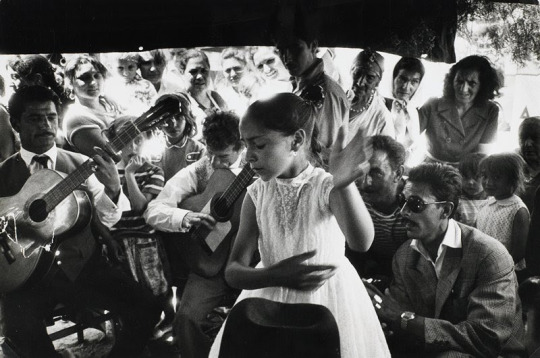
Folky Jazz ≠ Folk-Jazz: Think Piece & Spotify Playlist Swiss-born photographer Sabine Weiss’ photo, “Petite gitane et Manitas de Plata, Saintes-Maries-de-la-mer”, from 1960. (Click the image for a playlist we’ve created to share the beautifully ragged and rewilded sounds of “Folk-Jazz”.) —— The beauty of music is uncertain, moist, ageless, ungendered, untouchable. Folk is the we—us—which connects itself with music in strange ways. Connotations vary, but music usually springs forth at the mention of “Folk”. It has something to do with culture, but not in a high-brow way, rather, its essence has something to do with people, in general—the things we do; things we love; the ancient in us all. What we are. In music, Folk often references the place where a given music is created. It also connotes a peaceful tradition of oral history through music. Eventually, after field songs and hymns, folks began writing their own music, and a modern era of Folk was ushered by the likes of Bob Dylan, Woody Gutherie, Elizabeth Cotten, (& others)— folk wrote their own songs in the spirit of this original, place-based genre. The word doesn’t really matter (nor does this think piece you’re reading, if you even made it this far), but we’re getting somewhere. . . Jazz music developed alongside this atmosphere of song-making, oral histories, and place-based music at the turn of the century in New Orleans, Louisiana. It morphed into the big band swing era of the roaring twenties, during which jazz and dance bands were the popular music on the radio. Swing was king for a while until some revolutionary musicians started a new music which flipped everything on its head and added in elements of contemporary art, and impressionistic classical music, alongside break-neck rhythm and syncopations—enter bebop. The counterculture movement of the 60s was a back-to-the-land ethos whose music began to reference the ancient music of America, recreating it in a new, hyper-political lens of singer-songwriting. (The genre-ification of this music form has roots in Mississippi delta blues singer-songwriters, who played and sang with their guitars, and a case could be made for an outright theft of this form by the 60s folk revivalists.) Sonic pioneers—Martin Carthy, Paul Simon, Joni Mitchel, David Crosby, James Taylor, Joan Baez, and many more—added adventurous and slightly dissonant elements to their “folk” sound. Martin Carthy’s arrangement of “Scarborough Fair”—a traditional folk song—was probably the first example of “jazzier folk”, with some beautifully jazzy chords. Enter “Folk-Jazz” the genre, made up mostly of music with words, derived from roots music. On the instrumental, non-vocal side of this new movement was a set of experimentalists who delved further into Jazz and its liberated, mysterious sentiments: John Fahey. Sandy Bull. Leo Kotke. (Man of these were known as “American Primitivist” folk artists.) Pat Metheny. Jimmy Guiffre. Many tracks on Joni Mitchell’s “The Hissing of Summer Lawns”. There were also a number of musicians who came from the Jazz tradition and began incorporating more “folky” jazz sounds, and folk-inspired traditional music alongside the swinging, pagan jazz moods. This sounds lame, but it was a natural trajectory in some way, especially with the birth of the Environmental movement. Bill Smith. Carla Bley. Ornette Coleman. Paul Bley. Lee Konitz. Herbie Hancock. Charles Lloyd. Grant Green. Keith Jarrett. Paul Motian. Ornette Coleman. Ralph Towner. Ornette Coleman. Gabor Szabo. Chico Hamilton. Frank Zappa. Don Cherry. Sonny Rollins. Ornette Coleman, & Ornette Coleman. A strong case could be made to add the beboppers—especially with the rawness and grit of someone like Charlie Parker—into this list of “folk-jazzers” but I’ll spare you our opinions on that… Stay Safe, @UncivilizedTom Elizabeth Cotten - Freight train Martin Carthy - Scarborough Fair (feat. Dave Swarbrick) Joni Mitchell - The Jungle Line Joni Mitchell - I Don’t Know Where I Stand Bob Dylan - She Belongs to Me James Taylor - Secret Of Life - Live Bob Dylan - With God on Our Side Joni Mitchell - Roses Blue Joan Baez - Diamonds And Rust Crosby, Stills & Nash - Guinnevere - 2005 Remaster Sandy Bull - Electric Blend Ornette Coleman - Ramblin’ Charles Mingus - Better Git It in Your Soul Ornette Coleman, Jerry Garcia, Prime Time - 3 Wishes Ornette Coleman - Peace John Fahey - The Great San Bernardino Birthday Party - Instrumental Ornette Coleman, Pat Metheny - Song X Paul Motian - Sod House Keith Jarrett - Eyes Of The Heart - Pt. 1 / Live At Theater am Kornmarkt, Bregenz / 1976 John Fahey - St. Louis Blues - Original Recording Paul Motian - American Indian: Song Of Sitting Bull Crosby, Stills, Nash & Young - Deja Vu John Fahey - March! For Martin Luther King David Crosby - Music Is Love Keith Jarrett - Eyes Of The Heart - Pt. 2 / Live At Theater am Kornmarkt, Bregenz / 1976 Keith Jarrett - Encore (A-B-C) - Live At Theater am Kornmarkt, Bregenz / 1976 Keith Jarrett - Roads Travelled, Roads Veiled - Live At The Village Vanguard, New York / 1973 Keith Jarrett - The Rich (And The Poor) Keith Jarrett - (If The) Misfits (Wear It) - Live At Village Vanguard, New York / 1973 John Fahey - When The Springtime Comes Again Robbie Basho - A North American Raga (The Plumstar) - Vocal Sandy Bull - Blend George Winston - Theme for a Futuristic Movie Bill Evans - Peace Piece Miles Davis - Flamenco Sketches Miles Davis - Freedom Jazz Dance (Evolution of the Groove) Miles Davis - Fall Jimmy Giuffre - The Train and the River Jimmy Giuffre - Two Kinds of Blues Jimmy Giuffre, Paul Bley, Steve Swallow - In The Mornings Out There Paul Bley Trio - Ida Lupino Charlie Haden, Carla Bley, Don Cherry, Sharon Freeman, Mick Goodrick, Jack Jeffers, Michael Mantler, Paul Motian, Jim Pepper, Dewey Redman, Steve Slagle, Gary Valente - The Ballad Of The Fallen (Folk Song From El Salvador) Lee Konitz - Blues For Our Children John Coltrane - Alabama - Live At Birdland Jazzclub, New York City, NY, 10/18/1963 John Coltrane - Love Pat Metheny - Unity Village Pat Metheny - Question and Answer Pat Metheny Group - Above the Treetops Pat Metheny Group - (Cross The) Heartland Charles Lloyd, Billy Higgins - Oh, Karim Charles Lloyd, Billy Higgins - The Forest Chico Hamilton - Forest Flower Chico Hamilton - El Chico Sonny Rollins - I’m An Old Cowhand Chico Hamilton - Thoughts Sonny Rollins - John S. - Remastered Yusef Lateef - That Lucky Old Sun Paul Motian, Bill Frisell, Joe Lovano - Osmosis Part III Dan Tepfer, Lee Konitz - Trees Lee Konitz & Dan Tepfer - 9/11 Suite - Pt. I Lee Konitz & Dan Tepfer - Body & Soul Herbie Hancock - Oliloqui Valley - Remastered 1999 / Rudy Van Gelder Edition Herbie Hancock - Goodbye To Childhood - Remastered 2004 Frank Zappa - Zoot Allures Uncivilized - Reign STOMP Charlie Parker - Just Friends Charlie Parker - Red Cross Charlie Parker - The Gypsy Elvin Jones, Richard Davis - Elvin’s Guitar Blues Aaron Parks - Branchings Uncivilized, Levon Henry - Sherwood (Live) Sam Wilkes - Today Sam Amidon, Milford Graves - April (feat. Milford Graves) Sam Amidon - Sugar Baby Charlie Parker - Yardbird Suite Ornette Coleman - Lonely Woman
1 note
·
View note
Text
Monday Missive 03/2020 - “radical folk-jazz”
"Uncivilized’s radical folk-jazz suggests a top down realignment is more than just possible, but necessary." — Aquarium Drunkard

Welcome to UNICV MUSIC's weekly news email—a semi-anarcho-syndicalist, weekly roundup of all things Uncivilized.
This week, we look at a recent feature of Uncivilized's latest single "Reign STOMP" in Aquarium Drunkard's monthly Bandcamping column:
"The latest from Tom Csatari’s Uncivilized collective was released on Super Tuesday, which feels, conservatively, like seven years ago. But there’s nothing dated about this one, stuffed to the brim with swooning reeds and flutes, prickly electric guitar, and organ, shifting from comforting lulls to droning menace. With everyone confined to their quarters, it’s an optimal time to wonder what kind of future we’re going to have together. It either gets much better or much worse from here—Uncivilized’s radical folk-jazz suggests a top down realignment is more than just possible, but necessary." ~ Jason P. Woodbury & Justin Gage
If you visit aquariumdrunkard.com, it's the third article on the right when you scroll down to the main content (CLICK THE HAND):
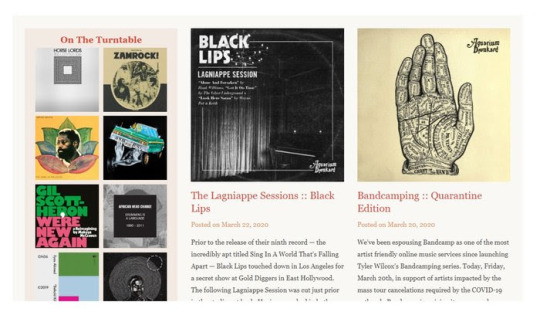
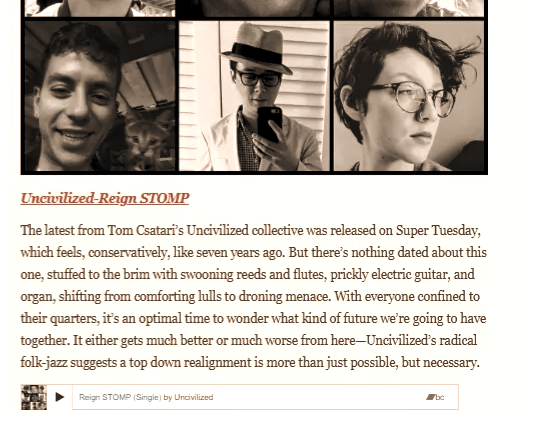
In addition, we've added several "merch" items to our bandcamp page, which is the best place to support the musicians of Uncivilized during this health crisis — the bandleader has two small children and is battling cancer and at least two Uncivilized performances have already been cancelled.
A new Uncivilized recording session is scheduled for June 2020 with Jaimie Branch (Fly or Die), Buz Donald (L'Rain), and Levon Henry (Joe Henry)—god willing: Here's hoping recorded music and albums will provide some respite from these current times.
Sincerely,
the UNCIV MUSIC Family
(we/they/us): unciv.org

$5 Uncivilized s/t Download Card
https://uncivmusic.bandcamp.com/album/uncivilized-s-t-wooden-download-card
Cherry wood, letter-pressed download card for Uncivilized’s self-titled, debut record on Tiny Montgomery Records (originally released under the bandleader's name on the now defunct label). Includes download of the full album as one track, like an old record.
"Its gigs are a bit raw, from general to specific, but raw on purpose. (Its recent album, also called “Uncivilized,” on the Tiny Montgomery label, is much the same way.)" — Ben Ratliff, The New York Times

$10 Uncivilized Deadstock New-Old Socks (White)
https://uncivmusic.bandcamp.com/album/hanes-deadstock-new-old-uncivilized-socks
50s HANES Rockabilly-style New Old white socks with handstamped Uncivilized stencil logo. Purchase includes download of Uncivilized's "Reign STOMP" single.
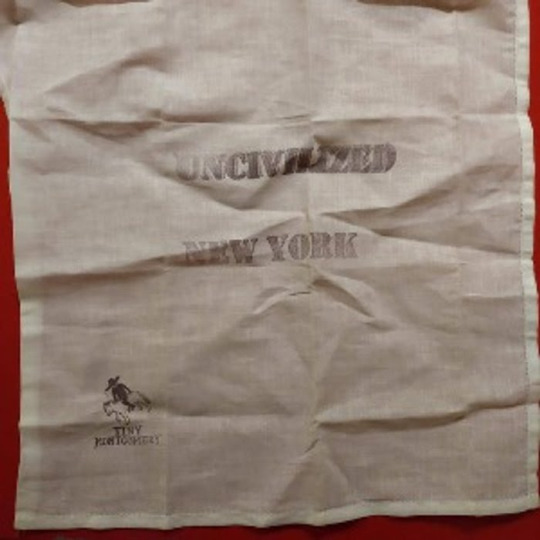
$12 Uncivilized 60s Cotton Handkerchief
https://uncivmusic.bandcamp.com/album/new-york-ep-deadstock-new-old-handkerchief
1960's "HAV A HANK" Deadstock (New Old) Handkerchief with Uncivilized New York EP stamp. Purchase includes a download of New York EP as a single track, like an old LP. (14"x14" 100% cotton).

$15 - Melted Candy Clear Vinyl
https://uncivmusic.bandcamp.com/album/melted-candy-ep-clear-7-vinyl
Lathe-cut, 7” (33 RPM) clear poly-carbonite vinyl record. Purchase includes a hi-fidelity download of the album.
"Uncivilized is a demonstration of the ever-shifting vision of guitarist Tom Csatari, who creates an intoxicating mix of psych-jazz, folk, and indie rock. He can attack a Lee Morgan comp as easily as an Elliott Smith tune, but it’s his original works where his most dramatic realizations occur. This four-song EP compiles four different versions of his ensemble, and while the abiding Csatari sound holds in each instance, the ascendant personality traits range from a rustic folk-jazz to the harmonic warmth of chamber jazz to indie-rock edge. None of this could ever be described as “catchy,” and yet there’s a memorable quality to the music that makes it irresistible." — Dave Sumner, Best New Jazz on Bandcamp December 2016
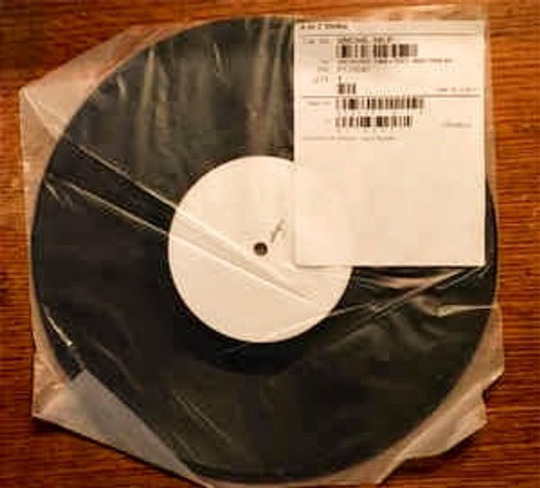
$30 - New York EP 10” Black Vinyl
https://uncivmusic.bandcamp.com/album/new-york-ep-10-vinyl
Limited-edition, test-pressing, 10" (78 RPM) black vinyl; there are only 5 of these left! Includes liner notes by Chad DePasquale and track-by-track poetry by flutist Tristan Cooley, as well as a hi-fidelity download of the album.
"Uncivilized is a little too raw to be called atmospheric, a little too pub-band to be called jazz, and a little too antivirtuoso to be called orchestral. This revolving group of horns, strings and percussion makes loosefitting music that seems to align with an alternative strain of New York City folklore — the genealogy of William S. Burroughs, Diane Arbus and John Zorn. Out next week, the collective’s latest EP, “New York,” consists of four tunes, each recorded live at a different since-closed watering hole in Brooklyn or Lower Manhattan. On Wednesday, Uncivilized celebrates the release by beginning a run of monthly shows at Barbès. For this performance the band will feature 12 musicians — including two guitarists, two bassists, two drummers and two bass clarinetists." Giovanni Russonello, The New York Times.
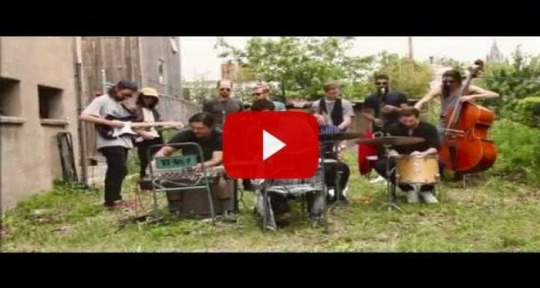
https://www.youtube.com/watch?v=EU12tbVmYl0
PS: We're up on Instagram, Facebook & Spotify if you flow in those realms...
0 notes
Text
Reign STOMP Redux
So here’s the thing… We wrote this soon after our first child was brought onto this earth—right after Donald Trump became president of the USA—and we remember, starkly, having to verbally acknowledge that out loud at some point during the first few weeks of little Nina’s life. The composition was created while the child slept in a bassinet. It began raining softly in the mildish New York-spring air—blowing through the window polluted and smoggy in our home office. A small kernel of an idea on the guitar led to a little melody with a frill in it—almost bebop, or maybe hard-bop, but who knows. Somehow it wants to land with a big major chord on the off beat (on four) like a tune by The Band, or something. Then it goes into a theme—romantic? laconic? lilting?—that fit right against the frilly intro. The theme was built on two American staples: the minor four chord (“Starman”, Bowie), and the two major (“That’ll Be The Day”, Buddy Holly). It expands from there, settling into a newer, semi-jam-band progression more likely to be heard in something like Robert Glasper’s projects or maybe Roy Hargrove’s RH Factor, than in heady jammers like Phish. (Moving from C major to A major back and forth is probably the antithesis of jam-band harmony, if there is such a thing.) Amidst the democratic swirl through the group solo section—swaying between two key centers as Dominic Mekky's organ sounds are warped through a tape delay pedal, shaking the bedrock—each element shimmers within a tug-of-war of peace. There’s slide guitar; there’s stretching; there’s squawking; there are slippery melodies which come and evaporate in a millisecond. At some point, the organism coalesces, agreeing upon a drone. (It’s in the sheet music—”reach group consensus on A chord, then move to Bb major”—a moment of collectivism rooted in virtuosic group listening and underplaying.) Then we’re back into the swelling swales of the intro, with Tristan Cooley’s flute trills calling like a bird over stacks of pastoral ambiance, including Nick Jozwiak’s bowed double bass. Theme remerges—pop on beat 4—dénouement to E major, we all slip away into vapours…
— Uncivilized (we/they/us)
www.unciv.org
Postscript:
Julian Cubillos takes a production credit here, as he is always the one making sure the levels and filters are working well and we remember consulting him about positioning when we were setting up. This was one of the rare occasions where we and Julian could hear both of our guitars (eachother) well, thanks to the crew at Pioneer Works, and to a relatively soft group volume. That’s the same pot you hear clanking about insouciantly that Rachel’s used in the band for many years now. Levon is on alto sax here—his work on “Climb”, his father’s song, is still my favorite “solo” out there; it’s all vibe—an amalgam of deep song and visceral realism (See: “Savage Detectives”; Bolaño, 1998.) There are some core moments when Casey Berman is hitting the Stomp-march-rhythm spot on, seeping through the detritus with that wooden-pillar, dry-bone clarinet I love so much (the sound of a loon?). This is our Stompiest to date, as we added trumpet for the occasion. It is Luther Wong’s debut on an Unciv. Recording, but he’s been playing with us since at least 2013, on at least a few Barbès hits. If you’re at all interested, the rest of this performance was recorded in similar hi-fidelity and features my neighbor Jaimie Branch sitting in for over half an hour, joining us on Joni Mitchell’s “Woodstock” and a reading of the Twin Peaks theme. Her dog was wandering on stage with us all throughout the evening.
a l l i n q u i r i e s : [email protected]
0 notes
Text
Uncivilized to Release New Single, “Reign STOMP” All Proceeds Going to Stacey Abrams’ Fair Fight Action Organization
DONATE TODAY:
https://uncivmusic.bandcamp.com/album/reign-stomp-single
:: Press Release ::
“Like human civilization itself, Uncivilized’s chaotic spontaneity blossoms into a rollicking beauty that’s greater than the sum of its parts.” — David, Community Manager: Soundrop
Uncivilized, the folk-jazz collective referred to by Impose Magazine as “The Bernie Sanders Jazz Band,” offers a new digital single entitled “Reign STOMP” March 3, 2020, Super Tuesday voting day. Recorded at Pioneer Works and mixed by Stephe Cooper (Cloud Becomes Your Hand), the release is an endorsement of Bernie Sanders’ campaign to be the Democratic Nominee for President of the United States.
All proceeds from the single, available via Bandcamp, will be donated to Stacey Abrams’ Fair Fight Action Organization, which is building voter protection teams with Democratic State Parties and local allies across the country to protect the right to vote.
“Voting is the bedrock on which our community’s future and your ambitions are built,” says Abrams. To that point, Uncivilized’s “Reign STOMP” is a fitting tribute to the challenge against mismanagement of elections that discourage and disenfranchise voters; the fight to expose corruption that puts special interests before voters; and the mission to build and engage a robust network of grassroots activists.
“Reign STOMP” starts with a blast from the nine-piece ensemble that is strong and unified, then morphs into the work of threading the voices of the various instruments together, resolving with another blast that says YES, we can make a difference.
Uncivilized (we/they/us):
unciv.org
[email protected]
Stacey Abrams Fair Fight Action:
fairfight.com
[email protected]
Tristan Cooley — flute
Levon Henry — alto sax
Casey Berman — bass clarinet
Luther Wong — trumpet
Tom Csatari — electric guitar, slide
Julian Cubillos — electric guitar, production
Dominic Mekky - transistor organ & effects
Nick Jozwiak — double bass
Rachel Housle — trap-set & percussion
Recorded at Pioneer Works, August 23, 2018 in Brooklyln, NY.:
www.pioneerworks.org.
Mixed by Stephe Cooper (Cloud Becomes Your Hand):
roto-asteriskrecords.bandcamp.com/album/home-of-bread
Artwork: 2018 selfies by each member of the band. Grid by UNCIV MUSIC. Photo touch-up by Joe Labate (joelabate.net).
0 notes
Text
Uncivilized Releases Debut Solo Guitar Album 31 Dec 2019
Uncivilized - "Placebo - Ish"
A nine-track, digital-only album of instrumental guitar tracks (the debut solo album from the freak-folk-jazz entity Uncivilized) featuring all new original material except for a rumble into the traditional carol “Good King Wenceslas”. Releasing on New Year’s Eve 2019, the collection further captures Uncivilized’s lo-fi, raw-jazz ethos in rare, pared down, guitar soli arrangements—melodies, harmonies, and rhythms in tact, coming alive through the artist’s unamplified hollowbody archtop guitar. They’ve been relatively dormant this year, but Uncivilized surprises us again with a last-minute catalog of new material from 2019. (Are all the year end lists closed? Is this Jazz? Who needs lyrics anyways?)
Purchase: https://uncivmusic.bandcamp.com/album/placebo-ish
PROCESS Recorded, mixed and mastered on 21 December 2019 with Soundation, a free direct-to-cloud, browser recording interface on Google Chrome with a 1955 Kay/Silvertone Aristocrat Archtop Hollowbody guitar—without plectrum.
ARTWORK A public domain image of Spanish architect Ricardo Bofill’s house (a formerly abandoned cement factory).
0 notes
Text
Uncivilized Releases Halloween Single: “Melted Candy STOMP”
Released on Halloween 2018, "Melted Candy STOMP" is an outtake from Uncivilized's 17-track digital compendium *Uncivilized Plays Peaks* (www.uncivilizedplayspeaks.com) — recorded live at the album's release show, featuring the freak-jazz 10-piece playing one of their own "STOMP" songscapes — stylized in all caps and referential to the New Orleans Stomp song form, as well as to the group's 2016 debut EP "Melted Candy", available on limited edition clear 7" vinyl (http://ignoreheroes.bandcamp.com/album/melted-candy). Stream:
Video:
youtube
Download: https://uncivmusic.bandcamp.com/album/melted-candy-stomp
0 notes
Text
Uncivilized @ Pioneer Works
Check this video of the band "songscaping" in the garden of Red Hook's Pioneer Works arts center during a community happy hour performance on Aug. 23 w/ Luther Wong (trumpet), Levon Henry (alto sax), Casey Berman (bass clarinet), Tristan Cooley (flute), Julian Cubillos (guitar), Tom Csatari (guitar), Dom Mekky (organ), Nick Jozwiak (double bass) & Rachel Housle (trap drums)
View this post on Instagram
A post shared by Sheetal Prajapati (@sdp80) on Aug 24, 2018 at 6:54am PDT
0 notes
Text
Uncivilized Plays Peaks Best New Jazz on Bandcamp July 2018
Excited to announce that the new Uncivilized live album was featured on Bandcamp Daily’s “Best New Jazz on Bandcamp July 2018″ list.
"freely roaming between genres... casual delivery and intense melodicism.”
It’s up here on Spotify—stream/purchase below:
Uncivilized Plays Peaks by Uncivilized
0 notes
Text
Bird is the Worm Previews Uncivilized Twin Peaks Tribute Album

Uncivilized’s forthcoming live album Uncivilized Plays Peaks is coming out July 1, 2018. With artwork by J’ai Lee Egna (above).
Dave Sumner’s Bird is the Worm blog just previewed the album with some very kind and interesting descriptions:
“[a] singular concoction of modern jazz, alt-folk, pop music, avant-garde, pure rock bombast and all kinds of other genre ingredients is what amps up the level of intrigue three or five notches.”
Preorder the album on Bandcamp below, and stream the first single today, a medley of the main Twin Peaks theme alongside one of Tom’s signature “Stomp” compositions and a romp through John Fahey’s arrangement of the traditional Good King Wenceslas:
https://uncivmusic.bandcamp.com/album/uncivilized-plays-peaks
0 notes
Link
0 notes
Link
0 notes
Text
Late one night last August, on the chalk downlands of southern England, Paul Kingsnorth stood in a field beside an old-growth forest, two yurts and a composting toilet. Kingsnorth is 41, tall, slim and energetic, with sweeping brown hair and a sparse beard. He wears rimless glasses and a silver stud in his ear, and he talks with great ardor, often apologizing for having said too much or for having said it too strongly.
On this occasion, Kingsnorth was silent. It was the final night of Uncivilization, an outdoor festival run by the Dark Mountain Project, a loose network of ecologically minded artists and writers, and he was standing with several dozen others waiting for the festival’s midnight ritual to begin. Kingsnorth, a founder of the group, had already taken part in several sessions that day, including one on contemporary nature writing; a panel about the iniquities of mainstream psychiatric care; and a reading from his most recent book, “The Wake,” a novel set in the 11th century and written in a “shadow language” — a mash-up of Old and modern English. He had also helped his two young children assemble a train set while trying to encapsulate his views on climate change and environmental degradation in what Kingsnorth describes as an era of global disruption. The “human machine,” as he sometimes puts it, has grown to such a size that breakdown is inevitable. What, then, do we do?
In the clearing, above a pyre, someone had erected a tall wicker sculpture in the shape of a tree, with dense gnarls and hanging hoops. Four men in masks knelt at the sculpture’s base, at cardinal compass points. When midnight struck, a fifth man, his head shaved smooth and wearing a kimono, began to walk slowly around them. As he passed the masked figures, each ignited a yellow flare, until finally, his circuit complete, the bald man set the sculpture on fire. For a couple of minutes, it was quiet. Then as the wicker blazed, a soft chant passed through the crowd, the words only gradually becoming clear: “We are gathered. We are gathered. We are gathered.”
After that came disorder. A man wearing a stag mask bounded into the clearing and shouted: “Come! Let’s play!” The crowd broke up. Some headed for bed. A majority headed for the woods, to a makeshift stage that had been blocked off with hay bales and covered by an enormous nylon parachute. There they danced, sang, laughed, barked, growled, hooted, mooed, bleated and meowed, forming a kind of atavistic, improvisatory choir. Deep into the night, you could hear them from your tent, shifting every few minutes from sound to sound, animal to animal and mood to mood.
The next morning over breakfast, Dougie Strang, a Scottish artist and performer who is on Dark Mountain’s steering committee, asked if I’d been there. When he left, at 3 a.m., he said, people were writhing in the mud and singing, in harmony, the children’s song “Teddy Bears’ Picnic.” (“If you go down in the woods today, you’re sure of a big surprise.”) “Wasn’t it amazing?” he said, grinning. “It really went mental. I think we actually achieved uncivilization.”
The Dark Mountain Project was founded in 2009. From the start, it has been difficult to pin down — even for its members. If you ask a representative of the Sierra Club to describe his organization, he will say that it promotes responsible use of the earth’s resources. When you ask Kingsnorth about Dark Mountain, he speaks of mourning, grief and despair. We are living, he says, through the “age of ecocide,” and like a long-dazed widower, we are finally becoming sensible to the magnitude of our loss, which it is our duty to face.
Kingsnorth himself arrived at this point about six years ago, after nearly two decades of devoted activism. He had just completed his second book, “Real England,” a travelogue about the homogenizing effects of global capitalism on English culture and character. “Real England” was a great success — the first of his career. All the major newspapers reviewed the book; the archbishop of Canterbury and David Cameron (then the opposition leader) cited it in speeches; Mark Rylance, the venerated Shakespearean actor, adopted it as a kind of bible during rehearsals for his hit play “Jerusalem.” Yet Kingsnorth found himself strangely ambivalent about the praise. “Real England” was a painful book to write. For months he interviewed publicans, shopkeepers and farmers fighting to maintain small, traditional English institutions — fighting and losing. Everywhere Kingsnorth traveled, he saw the forces of development, conglomeration and privatization flattening the country. By the time he published his findings, he was in little mood to celebrate.
At the same time, he felt his longstanding faith in environmental activism draining away. “I had a lot of friends who were writing about climate change and doing a lot of good work on it,” he told me during a break from his festival duties. “I was just listening and looking at the facts and thinking: Wow, we are really screwed here. We are not going to stop this from happening.”
The facts were indeed increasingly daunting. The first decade of the 21st century was shaping up to be the hottest in recorded history. In 2007, the Arctic sea ice shrank to a level not seen in centuries. That same year, the NASA climatologist James Hansen, who has been ringing the climate alarm since the 1980s, announced that in order to elude the most devastating consequences, we’d need to maintain carbon dioxide in the atmosphere at a level of 350 parts per million. But we’d already surpassed 380, and the figure was rising. (It has since reached 400 p.p.m.) Animal and plant species, meanwhile, were dying out at a spectacular rate. Scientists were beginning to warn that human activity — greenhouse-gas emissions, urbanization, the global spread of invasive species — was driving the planet toward a “mass extinction” event, something that has occurred only five times since life emerged, 3.5 billion years ago.
“Everything had gotten worse,” Kingsnorth said. “You look at every trend that environmentalists like me have been trying to stop for 50 years, and every single thing had gotten worse. And I thought: I can’t do this anymore. I can’t sit here saying: ‘Yes, comrades, we must act! We only need one more push, and we’ll save the world!’ I don’t believe it. I don’t believe it! So what do I do?”
The first thing that Kingsnorth did was draft a manifesto. Also called “Uncivilization,” it was an intense, brooding document that vilified progress. “There is a fall coming,” it announced. “After a quarter-century of complacency, in which we were invited to believe in bubbles that would never burst, prices that would never fall . . . Hubris has been introduced to Nemesis.”
The initial print run of “Uncivilization” was only 500 copies. Yet the manifesto gained widespread attention. The philosopher John Gray reviewed it in The New Statesman. Professors included it on their reading lists. An events space in Wales invited Kingsnorth and Dougald Hine, Dark Mountain’s co-founder, to put on a festival; 400 people showed up. Doug Tompkins, the billionaire who started the outdoor-apparel company the North Face, and his wife, Kristine Tompkins, the former C.E.O. of Patagonia, offered financing and invited Kingsnorth and his family to spend two months on land they own in southern Chile.
There were others, however, who saw Kingsnorth’s new work as a betrayal. With waters rising, deserts spreading and resource wars looming, how could his message be anything but reckless — even callous? He and his sympathizers were branded “doomers,” “nihilists” and (Kingsnorth’s favorite epithet) “crazy collapsitarians.” One critic, a sustainability advocate, published an essay in The Ecologist — a magazine Kingsnorth once helped run — comparing Dark Mountaineers to the complacent characters in the Douglas Adams novel “The Restaurant at the End of the Universe”: “Diners [who] enjoyed watching the obliteration of life, the universe and everything whilst enjoying a nice steak.”
Kingsnorth regards such charges with equanimity, countering that the only hope he has abandoned is false hope. The great value of Dark Mountain, he has claimed, is that it gives people license to do the same. “Whenever I hear the word ‘hope’ these days, I reach for my whiskey bottle,” he told an interviewer in 2012. “It seems to me to be such a futile thing. What does it mean? What are we hoping for? And why are we reduced to something so desperate? Surely we only hope when we are powerless?”
Instead of trying to “save the earth,” Kingsnorth says, people should start talking about what is actually possible. Kingsnorth has admitted to an ex-activist’s cynicism about politics as well as to a worrying ambivalence about whether he even wants civilization, as it now operates, to prevail. But he insists that he isn’t opposed to political action, mass or otherwise, and that his indignations about environmental decline and industrial capitalism are, if anything, stronger than ever. Still, much of his recent writing has been devoted to fulminating against how environmentalism, in its crisis phase, draws adherents. Movements like Bill McKibben’s 350.org, for instance, might engage people, Kingsnorth told me, but they have no chance of stopping climate change. “I just wish there was a way to be more honest about that,” he went on, “because actually what McKibben’s doing, and what all these movements are doing, is selling people a false premise. They’re saying, ‘If we take these actions, we will be able to achieve this goal.’ And if you can’t, and you know that, then you’re lying to people. And those people . . . they’re going to feel despair.”
Whatever the merits of this diagnosis (“Look, I’m no Pollyanna,” McKibben says. “I wrote the original book about the climate for a general audience, and it carried the cheerful title ‘The End of Nature’ ”), it has proved influential. The author and activist Naomi Klein, who has known Kingsnorth for many years, says Dark Mountain has given people a forum in which to be honest about their sense of dread and loss. “Faced with ecological collapse, which is not a foregone result, but obviously a possible one, there has to be a space in which we can grieve,” Klein told me. “And then we can actually change.”
Kingsnorth would agree with the need for grief but not with the idea that it must lead to change — at least not the kind of change that mainstream environmental groups pursue. “What do you do,” he asked, “when you accept that all of these changes are coming, things that you value are going to be lost, things that make you unhappy are going to happen, things that you wanted to achieve you can’t achieve, but you still have to live with it, and there’s still beauty, and there’s still meaning, and there are still things you can do to make the world less bad? And that’s not a series of questions that have any answers other than people’s personal answers to them. Selfishly it’s just a process I’m going through.” He laughed. “It’s extremely narcissistic of me. Rather than just having a personal crisis, I’ve said: ‘Hey! Come share my crisis with me!’ ”
In 2012, in the nature magazine Orion, Kingsnorth began to publish a series of essays articulating his new, dark ecological vision. He set his views in opposition to what he called neo-environmentalism — the idea that, as he put it, “civilization, nature and people can only be ‘saved’ by enthusiastically embracing biotechnology, synthetic biology, nuclear power, geoengineering and anything else with the prefix ‘new’ that annoys Greenpeace.” Or as Stewart Brand, the 75-year-old “social entrepreneur” best known as the publisher of the " Whole Earth Catalog,” has put it: “We are as gods and have to get good at it.”
For Kingsnorth, the notion that technology will stave off the most catastrophic effects of global warming is not just wrong, it’s repellent — a distortion of the proper relationship between humans and the natural world and evidence that in the throes of crisis, many environmentalists have abandoned the principle that “nature has some intrinsic, inherent value beyond the instrumental.” If we lose sight of that ideal in the name of saving civilization, he argues, if we allow ourselves to erect wind farms on every mountain and solar arrays in every desert, we will be accepting a Faustian bargain.
When Kingsnorth describes how he came to this way of thinking, he nearly always begins with an ancient chalk hill outside Winchester, not far from the site of the recent Uncivilization festival. It was 1992, and the conservative British government was about to break ground on a vast network of highways across England.
The highways were proposed three years earlier by Margaret Thatcher, whose administration announced that they would constitute the “biggest road-building program since the Romans.” As it happened, they would also cut through areas that had remained unspoiled since the Romans. Direct opposition to the program began at a hill called Twyford Down, through which the government planned to build a six-lane highway. The purpose of the road was to reduce the commute to London by a matter of minutes. In 1992, a small band of radicals calling themselves the Dongas staged a demonstration. Soon road protests were popping up across the country, drawing support from itinerant hippies, the working classes and the nobility.
Kingsnorth protesting the construction of a bypass near Bath in 1994. Credit Photograph by Adrian Arbib
Students of popular movements often credit the road protests of the 1990s with radicalizing a generation of British youth. This is certainly true of Kingsnorth. While at Oxford, he spent many weekends at Twyford Down — locking arms, waving placards, shouting slogans. He found it intoxicating to put himself on the line for a cause. At Twyford Down, he was arrested for the first time, for chaining himself, along with 50 others, to a bridge. He loved it. (He later sued the police and received a settlement of $5,000.) Kingsnorth was even more intoxicated by the proud impracticality of the protests. The core of the demonstrators’ complaints was not that the new highways would worsen air pollution, cause car accidents or fracture communities; it was that some things, like wilderness and beauty, were — despite, or perhaps because of, their “uselessness” — more important than getting to work on time. The motivation was raw, intuitive and, in its Wordsworthian love of the Arcadian, very, very English. In an essay titled “Confessions of a Recovering Environmentalist,” Kingsnorth wrote that after Twyford Down, he “vowed, self-importantly, that this would be my life’s work: Saving nature from people. Preventing the destruction of beauty and brilliance, speaking up for the small and the overlooked and the things that could not speak for themselves.”
It proved easier to make this vow than to act on it. The chief obstacle was his father: a driven, competitive man who scraped his way up from a working-class background to become the head of a manufacturing firm. Kingsnorth’s father was not without a love of the outdoors, but it was a striving, willful kind of love. He often took Kingsnorth on long, arduous hiking trips, forcing him to carry heavy packs and disappearing far up the trail to teach his son the virtues of independence and struggle.
These trips were both trials and revelations. It was while backpacking with his father on the moors of Cornwall and atop the hills of Northumberland that Kingsnorth had his first cathartic experiences in nature — experiences that were responsible for the direction his life was now taking. But his father wasn’t prone to seeing that as a consolation. “I’d gone off to Oxford as a guy in jeans and a T-shirt,” Kingsnorth says, “then I started wearing tie-dye tops and putting beads in my hair and walking around in big boots, as dudes do.”
Kingsnorth wouldn’t tell his father about his arrest for 10 years. Nor would he find a way to elude the expectations placed on him. His 20s were an awkward — and not very successful — mix of idealism and ambition. At Oxford he was editor of Cherwell, the university’s longest-running student newspaper, whose staff has included Graham Greene, W. H. Auden and (on the business end) Rupert Murdoch. He parlayed this honor into an entry-level position as a researcher at The Independent, in London. He was miserable. He found the work frivolous and his superiors out of touch. In 1995, seven years after the creation of the Intergovernmental Panel on Climate Change and six years after a global treaty regulating CFCs, he had to explain to an editor the difference between global warming and ozone depletion.
Kingsnorth lasted on Fleet Street for less than a year. He stayed in London another two, working for a poorly run nonprofit, writing a protest novel no one wanted to publish and getting increasingly fed up with the congestion and noise. Finally he returned to Oxford, figuring he would freelance. The rent was cheap, and in the late 1990s the pubs were filled with green activists and writers. But Kingsnorth has always found it difficult to stand still — another trait, he says, he inherited from his father. In 2001, hungry to travel, he took his agent’s advice to write a book about the growing anti-globalization movement, which came to prominence two years before when thousands gathered to protest the World Trade Organization in Seattle.
For Kingsnorth, the anti-globalization movement was both opportunity and mission. He attended mass protests in Prague, where he was tear-gassed for the first time, and Genoa, where the police shot and killed a young anarchist two streets from where Kingsnorth was marching. The experiences radicalized him anew. “It was similar to what I’d felt at the road protests,” he told me. “Here’s millions of people who don’t like this way of measuring the world, don’t like this way of living, don’t like this way of seeing the world.” He made reporting trips to four continents, tracing the movement’s roots and common themes.
His timing could not have been worse. His book came out in March 2003, during the first week of the Iraq war. It landed “with an inaudible thud.” He returned to Oxford and spent the next few years writing pamphlets, articles and another novel (for which, again, he could not find a publisher), and he began “Real England.”
In August 2007, as he was picking flowers in the small back garden of his house, he got a call that his father had killed himself. Kingsnorth’s father had been living in Cyprus, in semiretirement. His marriage had fallen apart. He had a nervous breakdown and spent time in a psychiatric hospital. One morning, he wrote a bitter suicide note, got in his car and drove full speed into a parked truck.
Kingsnorth’s reaction to his father’s death was conflicted. He’d often suspected that behind his own drive to achieve — to have his opinions aired on television and his books published by mainstream presses, to lead mass movements — was a need to satisfy his father’s more conventional expectations of him. Now that need was obsolete. He felt a sense of release, as if he’d been given permission to say what he wanted to say, in any way he wanted to say it. He felt he could finally, with a clear conscience, “go to the margins.” All he had to do was figure out what that meant.
“Do you know what the ‘first follower’ is?” Dougald Hine, Dark Mountain’s co-founder, asked me. It was Friday at dusk during the Uncivilization festival, and we had taken our dinners out to the woods to talk. We were sitting on logs, our paper plates balanced on our knees.
The first follower is a concept introduced by the musician and entrepreneur Derek Sivers in a short TED talk titled, “How to Start a Movement.” In the talk, Sivers shows an amateur video that begins with a shirtless man gyrating wildly on a hillside at what seems to be a concert. For a while the man dances alone, swinging his hips and arms as if possessed, or more likely high. Eventually someone joins him, and they hold hands and gyrate together. Before you know it, a full-fledged dance party has broken out.
“The point being,” Hine said, “that the first follower transforms you from a lunatic into someone who’s got the beginning of something.”
Photo
Kingsnorth, on stump, and Dougald Hine, in red sweater, at the 2013 Uncivilization festival. Credit Photograph by Bridget McKenzie
For Hine, the equivalent of the lone dancer was a pair of blog posts Kingsnorth wrote in late 2007. The first was a bilious rant announcing his retirement from journalism. (“The media can go hang. I’ve had it. I’m out.”) The second, written after yet another international climate conference sputtered out, expressed his “joyous” abandonment of hope that global warming could be stopped. Hine was just turning 30. A scruffy, bright-eyed man with an unruly mop of hair, he had for years worked, unhappily and off and on, as a radio reporter for the BBC. Like Kingsnorth, he quit in a spasm of disgust. Also like Kingsnorth, Hine experienced a transformation in his feelings about climate change: first an obsessive phase of turning off light switches and idling electronics; then a despondent “Oskar Schindler phase of ‘It’s never enough’ ”; then a point of curious repose. He emailed Kingsnorth and introduced himself. In the fall of 2008, they met at a pub in Oxford to discuss how they might collaborate.
During their first meeting, Kingsnorth and Hine spent most of their time exchanging influences — “showing each other our maps,” is how Hine puts it. Hine talked about his passion for the author and critic John Berger, who for the past four decades has lived and farmed in a small French village, and for the late Austrian priest and polymath Ivan Illich, a fierce critic of Western culture. Kingsnorth, in turn, introduced Hine to the American poet Robinson Jeffers, who quickly became a kind of lodestar for Dark Mountain.
Jeffers is little read today, but he was one of the most celebrated writers of the 1930s and 1940s. A friend of Edward Weston and D. H. Lawrence, he lived, as one critic put it, “like a reclusive movie-star-wizard” in a stone tower overlooking the Pacific, writing hundreds of poems endowed with the spirit of what he came to call Inhumanism — “a shifting of emphasis and significance from man to not-man.” At a time when the Great Depression was destroying millions of lives and Europe was militarizing for a new war, Jeffers saw human history as an inexorable, almost naturally destructive force. “The beauty of modern/Man is not in the persons,” he wrote in “Rearmament,” a poem that became the epigraph for “Uncivilization,’, “but in the/Disastrous rhythm, the heavy and mobile masses, the dance of the/Dream-led masses down the dark mountain.”
Kingsnorth and Hine’s aspirations for their manifesto weren’t revolutionary, but neither were they nihilistic. Each man draws a distinction between a “problem,” which can be solved, and a “predicament,” which must be endured. “Uncivilization” was firm in its conviction that climate change and other ecological crises are predicaments, and it called for a cadre of like-minded writers to “challenge the stories which underpin our civilization: the myth of progress, the myth of human centrality and the myth of separation from ‘nature.’ ”
Writers whose work more or less fit the manifesto’s bill answered Kingsnorth’s and Hine’s call. In 2010, he and Hine published the first in what has become a series of Dark Mountain books — literary journals, essentially — hard-bound and lavishly illustrated. Naomi Klein is by far the best known of the contributors, but the series also includes lengthy interviews with the cultural ecologist David Abram and the social critic Derrick Jensen.
Kingsnorth and Hine consider the books to be the heart of Dark Mountain’s work. Had it not been for the surge of interest that greeted the manifesto, Kingsnorth might have stopped there, retreating into the private life of a father and an artist. Retreat was, after all, what he was after — or what he thought he was after. In 2009, he and his wife, a psychiatrist with the National Health Service, decided to move from Oxford to Cumbria, in the far north of England. Kingsnorth wanted to spend his time writing; taking his children for hikes in the hills, as his father had taken him; and improving his skills on the scythe, a tool he valued for its simplicity and efficiency. (For the past three summers, he has taught scything classes in the area around his home.) Instead he found himself at the head of a burgeoning organization that even its critics might concede was changing the environmental debate in Britain and the rest of Europe. It was a slightly awkward position. Just when Kingsnorth had publicly abandoned faith in movements, he became the leader of one.
On the first night of the Uncivilization festival, in an open-sided shelter made of soft-wood planks and cedar shingles drawn from the surrounding woods, there was a concert. A choral group from London, the Songlines Choir, stood in front of a wide clay fireplace and performed music from Cape Verde and Turkey, as well as a song based on a poem that appeared in the third Dark Mountain book. The song centered on the plaintive, almost pleading refrain, “What matters is already here.” All the performers were dressed in fire-engine red. Later, a singer-songwriter named Marmaduke Dando — he describes himself, alternately, as “a neo-pagan vaudeville crooner” and the “bard of disempire” — sang a bitter and languid ballad titled “Love My Country, Hate My State.”
Watching the concert at the edge of the shelter, I met a young woman, Sarah Thomas, who’d spent the summer backpacking around England. Halfway through the show, we decided to check out an art project by Strang, the Scottish artist, that had emerged as the festival’s most popular draw. It was raining, and we walked up and down hills in the dark until we came to a tiny makeshift hut with a red door and a round wooden sign that read “Charnel House for Roadkill.”
The installation was inspired by a Barry Lopez essay in which he suggests that people pay respect to the lives of animals killed crossing roads and highways. (“You never know,” Lopez writes, “the ones you give some semblance of a burial, to whom you offer an apology, may have been like seers in a parallel culture. It’s an act of respect, a technique of awareness.”) The hut was cramped and eerie, decorated with the bones of small animals in illuminated glass cases. Haunting music was piped in from an iPod. You walked through a curtain, sat down and put on a heavy papier-mâché mask — a badger surrogate. Directly across from you, seated behind a window in the back wall, was another person — a volunteer — also wearing a badger mask. He or she sat silently, except when mirroring whatever movements you made, until, driven by emotion, fatigue, satisfaction or plain discomfort, you left.
Sitting in the hut, the air stale and the light almost nonexistent, I thought of something Hine told me earlier. “People think that abandoning belief in progress, abandoning the belief that if we try hard enough we can fix this mess, is a nihilistic position,” Hine said. “They think we’re saying: ‘Screw it. Nothing matters.’ But in fact all we’re saying is: ‘Let’s not pretend we’re not feeling despair. Let’s sit with it for a while. Let’s be honest with ourselves and with each other. And then as our eyes adjust to the darkness, what do we start to notice?’ ”
Hine compared coming to terms with the scope of ecological loss to coming to terms with a terminal illness. “The feeling is a feeling of despair to begin with, but within that space other things begin to come through.” Yet arriving at this acute state of “awareness of what’s worth doing with the time you’ve got left” isn’t always easy for Dark Mountain’s followers. “Some people come here,” Hine told me, “they get very excited by the fact that people are inspired, and they go: ‘Right! Great! So what’s the plan?’ ” He and Kingsnorth have worked hard to check this impulse, seeing Dark Mountain as a space to set aside what Kingsnorth refers to as “activist-y” urges.
This wasn’t always the case. At the first festival, in 2010, Kingsnorth behaved the way he thought the leader of a new movement ought to behave. He proselytized. He lectured. He gave a talk that he describes as “Here’s what’s wrong with environmentalism, and this is what must change!” But he quickly concluded that a didactic tone was inappropriate for the new group. Dark Mountain had more in common with the anarchism of Occupy Wall Street than with the collectivism of 350.org: everyone was to choose his or her own course of action. Recently, Kingsnorth and Hine decided not to hold any more festivals. They want to focus their limited resources on publishing more books more frequently, but they also don’t want the gatherings to ossify into a predictable program — or worse, an annual party.
For more conventional activists, Dark Mountain’s insistence on remaining impractical can be not only disorienting but also irksome. George Monbiot, one of the England’s most prominent environmental journalists, is among Kingsnorth’s oldest friends. In 2009, after the manifesto was published, he and Kingsnorth held a debate in The Guardian, for which Monbiot writes a column. It was a heated exchange. Kingsnorth argued that civilization was approaching collapse and that it was time to step back and talk about how to live through it with dignity and honor. Monbiot responded that “stepping back” from direct political action was equivalent to a near-criminal disavowal of one’s moral duty. “How many people do you believe the world could support without either fossil fuels or an equivalent investment in alternative energy?” he asked. “How many would survive without modern industrial civilization? Two billion? One billion? Under your vision, several billion perish. And you tell me we have nothing to fear.”
Naomi Klein also sees a troubling abdication in Kingsnorth’s work. “I like Paul, but he’s said rather explicitly that he’s giving up,” she told me. “We have to be honest about what we can do. We have to keep the possibility of failure in our minds. But we don’t have to accept failure. There are degrees to how bad this thing can get. Literally, there are degrees.”
On the surface, it can indeed seem as if Kingsnorth is giving up. Last week, he and his wife made a long-planned move to rural Ireland, where they will be growing much of their own food and home schooling their children — a decision, he explained to me, that stemmed in part from a desire to distance himself from technological civilization and in part from wanting to teach his children skills they might need in a hotter future. Yet Kingsnorth has never intended to retreat altogether. For the past three years, he has spent a good portion of his time trying to stop a large supermarket from being built in Ulverston, in northern England. “Why do I do this,” he wrote to me in an email, anticipating my questions, “when I know that in a national context another supermarket will make no difference at all, and when I know that I can’t stop the trend caused by the destruction of the local economy, and when I know we probably won’t win anyway?” He does it, he said, because his sense of what is valuable and good recoils at all that supermarket chains represent. “I’m increasingly attracted by the idea that there can be at least small pockets where life and character and beauty and meaning continue. If I could help protect one of those from destruction, maybe that would be enough. Maybe it would be more than most people do. “
It’s an ethic reflected in the novel he has just published. When he was a schoolboy, Kingsnorth told me, his teachers described the Norman Conquest, in 1066, as a swift transformation. An army of Norman and French soldiers from across the channel invaded England and swept away Anglo-Saxon civilization. The old ways vanished, and a new world emerged. He was surprised to learn, much later, that a resistance movement bedeviled the conquerors for a full decade. These resisters were known as the Silvatici, or “wild men.” Eventually William the Conqueror drove them from the woods and slaughtered every last one of them. They were doomed from the start, and knew it. But that hadn’t stopped them from fighting.
In Kingsnorth’s telling, it also didn’t stop them from wondering whether they should keep fighting. On the afternoon following the concert, standing in the wooden shelter, he described his novel as being both about the collapse of a civilization and about the collapse of long-cherished certainties about what it means to be civilized. His introductory remarks were lively and entertaining, but nervously so, as if he were reluctant to begin. Later, he told me it was the first time he’d ever read publicly from the book. He read a strange excerpt, a sort of dream vision about a young boy and a stag. “I have no idea which part of my subconscious I dredged this up from,” he later wrote me, “but the conversation they end up having is pretty much the conversation I have with myself at the moment when it comes to what the hell I can possibly do to be of any use at all”:
when will i be free saes the cilde to the stag
and the stag saes thu will nefer be free
then when will angland be free
angland will nefer be free
then what can be done
naht can be done
then how moste i lif
thu moste be triewe that is all there is
be triewe
be triewe
“I hope these ramblings are of some use to you!” he signed off. “I will have a glass of wine now and try not to worry about it.”
0 notes